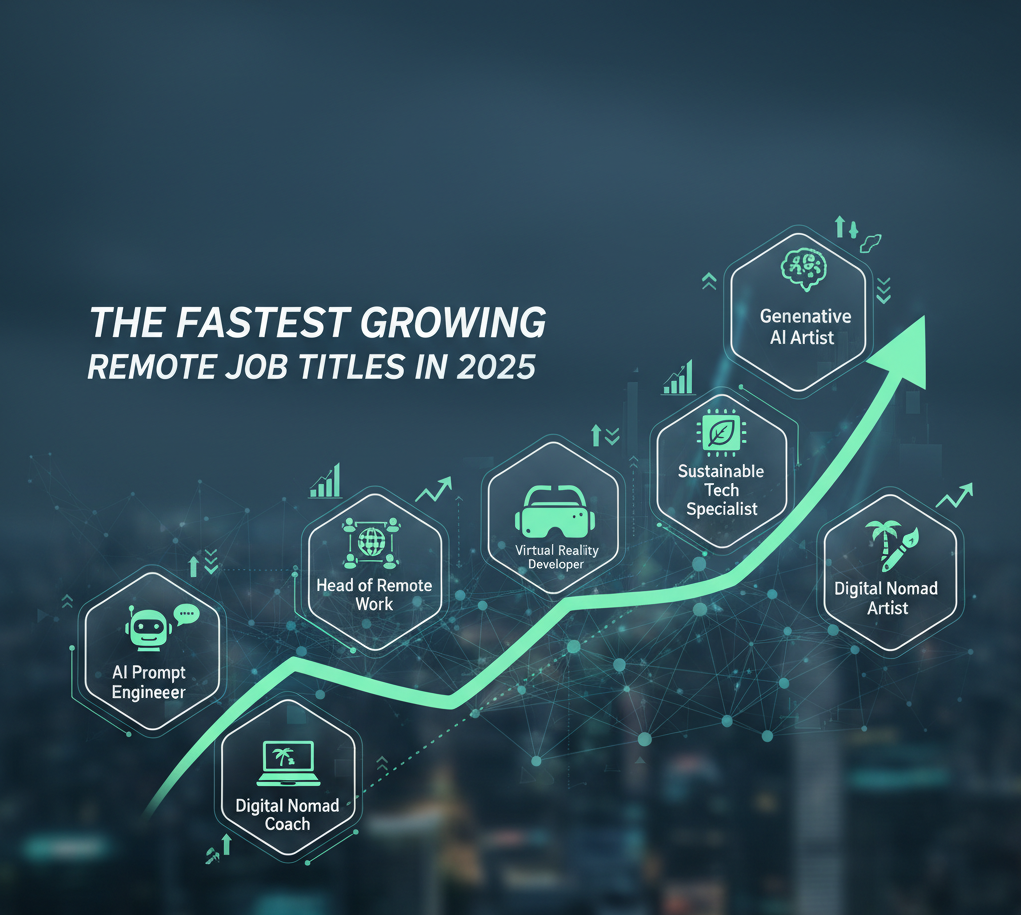Introduction
The fastest growing remote job titles in 2025 reflect how dramatically the global workforce is changing. Remote work has shifted from being a temporary pandemic solution to a long-term strategy that companies and professionals now fully embrace.
As businesses adopt digital-first models, new job roles are emerging at a rapid pace, reshaping industries and redefining career opportunities. In 2025, these trending roles highlight the need for expertise in technology, leadership, and digital communication.
Companies are prioritizing skills in cybersecurity, AI, digital marketing, and project management, while employees seek flexibility and global career options. By looking closely at the fastest growing remote job titles in 2025, professionals can align their skills with future opportunities and position themselves for long-term success in the evolving economy.
The fastest-growing remote job titles in 2025 reflect a shift in business priorities. Companies are focusing on digital transformation, cybersecurity, AI-driven solutions, and global talent sourcing. At the same time, employees are seeking meaningful careers that allow them to balance productivity with personal freedom. By examining these in-demand roles, professionals can better prepare to align their skills with market needs. Let’s explore the job titles making the biggest impact in 2025 and why they matter for anyone looking to thrive in the remote economy.
You can read the summary of this article here.

Digital Marketing Specialists: Driving Growth Across Borders
Marketing has always been about reaching the right audience, but in 2025, the digital landscape has become more competitive than ever. Remote-first businesses need professionals who can create campaigns that resonate globally. Digital Marketing Specialists now play a central role in helping brands scale without geographic barriers.
What makes this title grow so rapidly is its adaptability. A specialist can manage SEO strategies for a startup in Berlin while simultaneously running paid ad campaigns for a client in New York. The flexibility of online platforms means expertise in social media, email marketing, and content strategy can be applied across industries. In addition, businesses now demand measurable results, which puts analytics and performance tracking at the core of this role.
Another reason for its explosive growth is the rise of AI-powered marketing tools. Specialists who understand how to blend automation with human creativity are not only in demand but often leading entire campaigns remotely. With companies reducing traditional advertising budgets and investing more in digital outreach, this role continues to expand at a remarkable pace.
AI and Automation Experts: The Future of Work, Delivered Remotely
Artificial intelligence is no longer a futuristic concept; it’s a business necessity. In 2025, companies are racing to integrate AI into customer service, data analysis, and product development. This trend has created massive demand for AI and Automation Experts, many of whom operate fully remotely.
Their role is to design and implement systems that streamline workflows, reduce costs, and improve decision-making. For example, a remote AI specialist might develop a chatbot for a global e-commerce brand or create algorithms that optimize supply chains. Since these solutions are digital by nature, there is little need for physical presence, making this title ideal for remote setups.
The rise of generative AI has only increased demand for these professionals. Businesses now seek experts who can ensure ethical AI usage, maintain transparency, and align automation with company goals. Furthermore, industries like healthcare, finance, and education are rapidly adopting AI-driven tools, which means opportunities for specialists continue to multiply. Remote AI professionals are essentially shaping how work will function in the coming decade.
Cybersecurity Analysts: Protecting a Border less Workforce
With the shift to remote work comes a surge in digital vulnerabilities. By 2025, cybersecurity will no longer just be an IT department concern; it’s a business-wide priority. Companies are hiring Cybersecurity Analysts at record speed, especially those comfortable working remotely across multiple time zones.
These professionals safeguard sensitive information, monitor systems for threats, and respond to breaches in real time. Their work has become even more critical as businesses handle increasing amounts of customer data online. Cloud storage, digital payments, and virtual collaboration tools create opportunities but also risks, making cybersecurity expertise indispensable.
Unlike traditional IT jobs tied to office infrastructure, remote analysts thrive in distributed environments. They rely on advanced monitoring tools, encryption systems, and zero-trust frameworks that can be managed from anywhere in the world. Employers value not only technical skills but also problem-solving and quick decision-making traits that help analysts neutralize threats before they escalate.
The demand for cybersecurity talent is so high that remote analysts are among the best-paid professionals in 2025. Organizations understand that without robust security measures, innovation and growth remain vulnerable. As long as cyber threats exist, this role will remain a cornerstone of the remote job market.
Remote Project Managers: Coordinating Teams Without Borders
Global collaboration has become the new standard, and with it comes the need for strong leadership. Remote Project Managers are among the fastest-growing job titles in 2025 because companies require professionals who can coordinate distributed teams efficiently.
Their role involves more than just task management. Project Managers act as the glue holding international teams together, ensuring deadlines are met, resources are allocated wisely, and communication stays clear. Tools like Asana, Trello, and Jira make coordination possible across time zones, but it takes human leadership to align team goals with business outcomes.
One reason this role is thriving is the shift toward hybrid and asynchronous workflows. Remote Project Managers excel at balancing flexibility with accountability. They understand how to manage both freelancers and full-time employees, creating environments where everyone contributes effectively regardless of location.
Businesses recognize that successful projects depend less on where people work and more on how they collaborate. As a result, skilled project managers who can handle cultural differences, adapt to digital platforms, and keep teams motivated are highly sought after. This title perfectly illustrates how remote leadership is evolving to meet modern demands.
Conclusion: Preparing for the Remote Future
The fastest-growing remote job titles in 2025 reveal a clear trend: companies need digital expertise, technological innovation, and strong leadership to thrive in a borderless economy. Roles such as Digital Marketing Specialists, AI and Automation Experts, Cybersecurity Analysts, and Remote Project Managers highlight the skills that matter most in the years ahead. Each position reflects a growing reliance on technology and the ability to work effectively across global teams.
For professionals, this means opportunity. By investing in digital skills, embracing adaptability, and staying updated on market shifts, anyone can position themselves for success in the evolving world of remote work. Employers, on the other hand, must prioritize building distributed teams that can securely and efficiently.
Remote work is no longer just an option; it’s the future of employment. Those who align their careers with the the fastest-growingg remote job titles of 2025 will not only secure stable opportunities but also play a role in shaping the next chapter of global work culture.
Find Your Dream Job Today Explore Endless Career Opportunities and Secure Your Next Role with Best Job Tool



